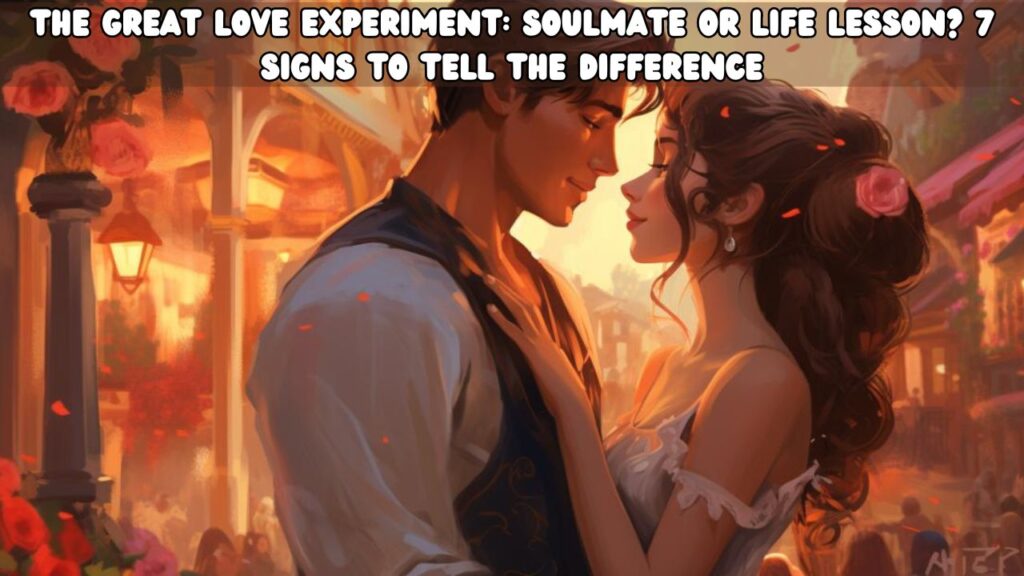Welcome, dear readers, to “The Great Love Experiment,” an exploration that delves into the heart of our deepest connections. Here, we seek to unravel a mystery that has intrigued and perplexed many: the difference between a soulmate and a life lesson. Is every profound connection destined to be a lifelong journey, or is it a stepping stone leading to personal growth? As we navigate this intricate terrain, let’s embark on a journey of self-discovery, where love serves not just as a companion but also as a teacher.
Understanding the Concept: Soulmate vs. Life Lesson
To lay the groundwork for this exploration, let’s first define our key terms. A soulmate is often perceived as a person with whom you have a profound, almost spiritual connection. This bond goes beyond the surface, touching the depths of who we are. It’s a relationship marked by a sense of completeness and an intuitive understanding that often defies logic.
On the flip side, a life lesson in the realm of relationships refers to connections that are primarily intended to teach us something vital. These bonds, sometimes intense and challenging, are not necessarily meant to last a lifetime but are crucial in shaping our character and approach to future relationships.
Understanding the distinction between these two can illuminate our paths, offering clarity in the often-bewildering world of human connections.
Why It Matters: The Impact on Personal Growth
The significance of differentiating between a soulmate and a life lesson lies in its impact on personal growth. Encounters with life lessons, while sometimes painful, are invaluable in teaching us about our boundaries, beliefs, and the changes we need to make to evolve. They are the crucibles in which our strength and resilience are forged.
Conversely, soulmate connections offer a different kind of growth. They nurture us, challenge us in healthy ways, and encourage us to become the best versions of ourselves. These relationships are less about changing who we are and more about revealing our most authentic selves.
Understanding which type of relationship we are experiencing can help us set realistic expectations, appreciate the journey, and glean the wisdom each encounter offers.
Setting the Stage for Self-Discovery in Relationships
Embarking on “The Great Love Experiment” is essentially setting the stage for profound self-discovery. Each relationship, whether with a soulmate or a life lesson, acts as a mirror, reflecting parts of ourselves we may not have seen clearly. It’s through the dynamics of these relationships that we uncover hidden truths about our desires, fears, and values.
Recognizing whether our connections are soulmates or life lessons is not just about understanding the other person; it’s profoundly about understanding ourselves. It challenges us to ask deeper questions: What do we truly seek in a relationship
? What are our non-negotiables, and where can we be more flexible? How do our relationships shape our identity and our path in life?
This journey of self-discovery in relationships is not a linear path. It’s an intricate dance of introspection, experience, and emotional intelligence. By being mindful and open to learning from both soulmates and life lessons, we equip ourselves with the wisdom to make more informed choices in our love lives. We become better at recognizing what we need and want, and equally important, what we can offer to others.
Sign #1: Depth of Connection

As we embark on deciphering the first sign in “The Great Love Experiment,” we delve into the realm of Depth of Connection. This is the cornerstone of distinguishing between a soulmate and a life lesson. The depth of connection with someone goes far beyond the superficial layers of casual interactions and touches the very essence of who we are.
Beyond Surface-Level: Emotional Resonance
The first indicator of a deep connection is Emotional Resonance. This is where our interactions transcend the ordinary and evoke a profound emotional response. With a soulmate, you might find that your emotions are in tune, almost as if they’re playing the same melody in a harmonious rhythm. You feel understood, valued, and seen at a level that is rare.
In contrast, a relationship that’s more of a life lesson might lack this level of emotional synchronicity. These interactions can often feel disjointed or one-sided. While they may be intense, they lack the harmony and mutual understanding that characterizes a deeper emotional resonance.
Communicating Without Words: Understanding Nonverbal Cues
The second aspect of a deep connection is the ability to Communicate Without Words through Nonverbal Cues. In a connection that runs deep, there’s often an unspoken understanding. A look, a gesture, or even a pause can convey volumes. This silent language of love is a hallmark of soulmate connections, where comprehension transcends verbal communication.
In contrast, life lesson relationships may struggle in this area. Misinterpretations and misunderstandings can be frequent, indicating a lesser degree of nonverbal attunement. While these challenges can lead to personal growth, they often highlight the contrast between a soul-deep connection and a more surface-level interaction.
The Role of Intuition in Recognizing a Deep Bond
Lastly, we come to The Role of Intuition in recognizing a deep bond. Intuition is that inner voice, often a whisper, guiding us towards truth. When you meet a soulmate, your intuition might send you a strong, affirmative signal. It’s like an internal nod that says, “This is right, this is different.”
In life lesson relationships, intuition might also play a role, but often it’s in the form of a caution, a learning curve, or a realization that something significant, albeit challenging, is unfolding. Learning to trust and interpret these intuitive feelings is crucial in navigating the waters of love and relationships.
Sign #2: Growth Dynamics

Progressing to the second sign in our exploration, we focus on Growth Dynamics within relationships. This sign is pivotal in differentiating between a soulmate connection and a relationship that serves as a life lesson. Growth dynamics refer to how each relationship fosters personal development and mutual evolution.
Supporting Mutual Growth: The Soulmate Indicator
Mutual Growth is a defining characteristic of soulmate relationships. When you’re with a soulmate, there’s a natural inclination towards supporting each other’s aspirations and dreams. This isn’t just about cheering from the sidelines; it involves active engagement and encouragement in each other’s personal growth journeys.
In these relationships, growth is not a solitary pursuit. Instead, it’s a shared endeavor where each person’s development enhances the other’s. There’s a synergy where the sum of individual growth leads to a stronger, more profound union. The relationship becomes a fertile ground for both individuals to flourish, not just as partners but as individuals.
Lessons Learned: How Life Lessons Shape Us
Conversely, in relationships that are more aligned with life lessons, growth often comes through challenges and sometimes, even conflicts. These relationships teach us about resilience, boundaries, and self-awareness. They might be tough and even painful at times, but they are instrumental in shaping our character.
In these dynamics, the growth is often more introspective. It’s about learning what doesn’t work for us, understanding our limits, and gaining clarity on what we truly seek in a relationship. While these lessons can be difficult, they are invaluable in our journey towards emotional maturity and relationship wisdom.
Recognizing Growth Patterns in Your Relationship
To truly understand the nature of our relationships, it’s important to Recognize the Growth Patterns within them. This involves reflecting on whether the relationship is enhancing your personal development or if it’s primarily highlighting areas that need change or improvement.
Ask yourself: Are you growing together, or are you growing apart? Does the relationship challenge you in a way that builds you up, or does it wear you down? Understanding these patterns can provide profound insights into whether you’re in the midst of a soulmate connection or a life lesson.
Sign #3: Conflict Resolution

Moving on to the third critical sign in “The Great Love Experiment,” we explore Conflict Resolution. The manner in which conflicts are handled within a relationship can be a significant indicator of whether it’s a soulmate connection or a pivotal life lesson. Effective conflict resolution contributes to the health and longevity of a relationship, while poor conflict management can lead to its deterioration.
Healthy Disagreements: The Hallmark of a Soulmate
One of the key aspects of a soulmate relationship is the presence of Healthy Disagreements. Contrary to the notion of a conflict-free relationship, soulmates often engage in disagreements. However, the defining factor is how these disagreements are approached and resolved.
In a soulmate relationship, conflicts are not about winning an argument or proving a point; they are opportunities for understanding and growth. These disagreements are handled respectfully and empathetically, ensuring that both parties feel heard and valued. The focus remains on finding a mutual solution rather than on individual egos. This healthy approach to disagreements strengthens the bond and deepens the understanding between soulmates.
Learning Through Conflict: The Life Lesson Perspective
In contrast, relationships that serve as life lessons often involve Learning Through Conflict. These conflicts might be more intense and challenging, pushing us to confront aspects of ourselves or our approaches to relationships that need change or improvement.
While these conflicts can be painful, they are often necessary for personal growth. They teach us about our limits, our needs, and how to better communicate. They might highlight unhealthy patterns or behaviors that we need to address. In essence, conflicts in life lesson relationships can act as catalysts for important transformations within ourselves.
The Importance of Resolving Conflicts Constructively
Regardless of whether a relationship is with a soulmate or a life lesson, Resolving Conflicts Constructively is crucial. This involves actively listening, expressing oneself clearly and respectfully, and seeking a resolution that considers the needs of both parties. It’s about finding common ground and working towards reconciliation without causing further harm.
Constructive conflict resolution is a skill that benefits all relationships. It leads to greater understanding, deeper respect, and a more solid foundation for the future. Learning to resolve conflicts constructively is not just about maintaining harmony in a relationship; it’s about fostering an environment where love, respect, and understanding can flourish.
Sign #4: Longevity and Future Planning

As we navigate further into “The Great Love Experiment,” we reach the fourth sign: Longevity and Future Planning. This aspect of a relationship is a telling indicator of its nature and potential future. It revolves around how both partners perceive their journey together in the long run and their plans for a shared future.
Envisioning a Shared Future: A Sign of a Soulmate
Envisioning a Shared Future is a critical characteristic of a soulmate relationship. When you are with a soulmate, there’s a natural and mutual inclination towards thinking about and planning a future together. This isn’t just about short-term plans or casual discussions but involves deep conversations and serious considerations about a life shared.
In a soulmate relationship, both partners see each other as integral parts of their future. This vision is often laden with excitement, hope, and a profound sense of certainty. Whether it’s about career plans, living arrangements, family aspirations, or personal goals, there’s a harmonious alignment in how both envision their journey ahead. This alignment doesn’t imply that everything is perfectly in sync, but there’s a willingness and commitment to aligning these visions and working through differences to build a future together.
Temporary Yet Impactful: The Nature of Life Lessons
On the other hand, relationships that are more aligned with Life Lessons often have a different approach to longevity and future planning. These relationships might not be destined for a long-term future, but they are incredibly impactful in the moment and for personal growth. They are characterized by their transient nature, yet the lessons they impart have long-lasting effects on personal development and future relationships.
In these connections, the focus is less on building a life together and more on the here and now. The relationship may serve as a critical stepping stone, helping you to understand what you truly want and don’t want in a long-term partner. The end of such relationships, often though painful, is a crucial part of the learning and growing process.
Assessing Your Long-Term Compatibility and Goals
An essential part of navigating relationships involves Assessing Your Long-Term Compatibility and Goals. This means looking beyond the present and considering whether your life goals, values, and visions for the future align with your partner’s. It’s about understanding how well you fit together in the larger picture of life.
For a relationship to thrive in the long term, it’s vital to have compatible life goals and values. This doesn’t mean you have to agree on everything, but there should be a fundamental level of agreement or a willingness to find middle ground on crucial life decisions. Assessing this compatibility early on can save much heartache and ensure that both partners are moving forward with a clear understanding of what they want and expect from each other.
Sign #5: The Role of Trust and Security

Advancing to the fifth critical sign in “The Great Love Experiment,” we examine The Role of Trust and Security in relationships. Trust is the bedrock upon which meaningful and lasting relationships are built. It’s a key component in distinguishing between a soulmate connection and a relationship that serves as a life lesson.
Unwavering Trust: The Foundation of a Soulmate Relationship
Unwavering Trust is fundamental in a soulmate relationship. This kind of trust goes beyond the basic assurance of fidelity or honesty; it encompasses a deeper sense of security and confidence in the relationship. When you’re with a soulmate, trust is implicit. You feel secure in the knowledge that your partner has your best interests at heart, respects you, and cherishes your connection.
This unwavering trust manifests in various ways. It means not having to second-guess your partner’s intentions, feeling safe to be vulnerable, and knowing that the relationship is a safe space for both individuals to grow and evolve. Such a level of trust fosters open communication, deepens emotional intimacy, and creates a strong foundation for the relationship to thrive.
Trust as a Learning Curve: Understanding Life Lessons
In contrast, in relationships that serve as Life Lessons, trust can often be a learning curve. These relationships might challenge your perceptions of trust, either through betrayals, misunderstandings, or consistent letdowns. While these experiences can be painful, they are crucial in teaching you about setting boundaries, recognizing red flags, and understanding your own needs in terms of trust and security.
These life lessons help in developing a clearer sense of what you can and cannot tolerate in a relationship. They also play a significant role in teaching you how to rebuild trust – both in yourself and in future partners. Learning to navigate trust issues can lead to significant personal growth and a better understanding of what a healthy, trustworthy relationship looks like.
Building and Sustaining Trust in Relationships
Regardless of the nature of the relationship, Building and Sustaining Trust is essential. This involves consistent effort from both partners. It’s about being reliable, transparent, and open. Trust is built through small actions over time – it’s keeping promises, communicating effectively, showing empathy, and being there for each other.
Rebuilding trust, if it has been broken, is a challenging but crucial process. It requires patience, forgiveness, and a commitment to healing and moving forward. Whether you are in a soulmate relationship or learning from a life lesson, working on building and sustaining trust is key to the health and longevity of any relationship.
Sign #6: The Nature of Support and Encouragement

As we delve into the sixth sign of “The Great Love Experiment,” we turn our focus to The Nature of Support and Encouragement in relationships. This sign plays a crucial role in determining whether a connection is with a soulmate or is part of a life lesson. The type and quality of support and encouragement offered in a relationship can reveal much about its depth and intention.
Unconditional Support: The Mark of a Soulmate
Unconditional Support is a hallmark of a soulmate relationship. When you are with a soulmate, their support often feels unwavering and steadfast. This kind of support goes beyond mere words of encouragement; it’s a deep-rooted belief in your abilities and dreams, even in moments when you doubt yourself.
A soulmate’s support is not conditional on your success or failures. They stand by you through various phases of life, offering a hand to hold during challenges and celebrating your victories as their own. This level of support fosters a sense of security and confidence, enabling you to take risks and pursue your goals, knowing that you have a solid backing in your partner.
Encouragement as a Learning Tool in Life Lessons
In relationships that serve as Life Lessons, encouragement often comes in the form of challenges and sometimes, constructive criticism. These relationships can push you out of your comfort zone, forcing you to confront weaknesses or areas of improvement. While this may not always feel supportive in a traditional sense, it plays a vital role in personal development.
These experiences teach resilience, self-reliance, and the ability to self-motivate. They can also help you recognize the importance of being your own biggest supporter. While these lessons can be tough, they are instrumental in building character and preparing you for future relationships where balanced support and encouragement are key.
Evaluating the Quality of Support in Your Relationship
An important aspect of understanding the dynamics of your relationship involves Evaluating the Quality of Support you both give and receive. This means reflecting on whether the support is consistent, genuine, and tailored to your needs. Does the support from your partner inspire you to grow, or does it keep you stagnant? Is the encouragement you receive based on
mutual respect and understanding, or does it come with strings attached?
It’s also crucial to assess how you support your partner. Is your support conditional? Do you encourage their dreams and aspirations? The balance of support in a relationship often speaks volumes about its health and sustainability. A supportive partnership is characterized by mutual upliftment, where both individuals feel empowered and acknowledged.
In evaluating the quality of support, consider the following aspects: Does the support help in facing fears and overcoming obstacles? Is there a sense of safety in being vulnerable and sharing aspirations? How does the support impact your self-esteem and confidence? The answers to these questions can offer deep insights into the nature of the relationship and whether it aligns more with a soulmate connection or a life lesson.
Sign #7: Alignment of Core Values and Beliefs

As we approach the final sign in our exploration of “The Great Love Experiment,” we focus on the Alignment of Core Values and Beliefs. This sign is a profound indicator of the nature of a relationship, revealing whether it is more likely a soulmate connection or a significant life lesson. The compatibility and alignment, or lack thereof, in core values and beliefs between partners can deeply influence the relationship’s dynamics and longevity.
Shared Values: The Soulmates’ Common Ground
Shared Values often form the common ground in soulmate relationships. When you share core values and beliefs with your partner, it creates a strong foundation for the relationship. These shared values might encompass various aspects such as life goals, family, ethics, spirituality, or how to approach challenges.
In a soulmate relationship, these shared values facilitate a deep sense of understanding and connection. They often lead to a smoother relationship dynamic where major conflicts are less frequent, as both partners are generally aligned on the fundamental aspects of life and the relationship. This alignment doesn’t mean that there won’t be differences or disagreements, but it does mean that there’s a basic framework within which both partners operate, making it easier to navigate through life together.
Divergent Beliefs: Discovering and Learning from Differences
Conversely, relationships that serve as life lessons often feature Divergent Beliefs and values. These differences can be challenging, but they are also incredibly valuable for personal growth and development. Interacting with someone whose beliefs and values differ significantly from yours can expand your perspective, challenge your preconceptions, and teach you tolerance and understanding.
In these relationships, the learning comes from navigating these differences. It’s about finding respect for viewpoints that diverge from your own and developing the ability to agree to disagree. While such relationships might not always last, the lessons learned from them can be instrumental in shaping your future relationships, helping you understand what you truly value and seek in a partner.
Assessing How Values Influence Your Relationship Dynamics
An essential part of understanding your relationship is Assessing How Values Influence Your Relationship Dynamics. This involves reflecting on how your individual beliefs and values play out in everyday interactions. Are they a source of conflict, or do they bring you closer? Do your values support mutual growth and respect, or do they create barriers?
Understanding the role of values in your relationship helps in determining the compatibility and potential longevity of the connection. It’s important to recognize whether the differences in values are something that can be harmoniously navigated, or if they are fundamental disparities that could potentially lead to ongoing conflict. This assessment is crucial in understanding whether you are in a relationship with a soulmate, where values are aligned, or in one that is more of a life lesson, where the divergence in values is part of your growth journey.
Conclusion: Embracing the Journey

As we conclude our exploration of “The Great Love Experiment,” it’s time to step back and embrace the entirety of our journey through the realms of love, relationships, soulmates, and life lessons. This journey, with its twists and turns, highs and lows, offers invaluable insights into our hearts and souls.
Reflecting on Your Personal Love Experiment
Reflecting on Your Personal Love Experiment involves looking back at your past and present relationships with a lens of introspection and understanding. Each relationship you’ve experienced, no matter how brief or long-lasting, how joyful or painful, has contributed to your personal narrative and growth.
This reflection is an opportunity to acknowledge the lessons learned, the strengths gained, and even the vulnerabilities uncovered. Ask yourself what each relationship has taught you about love, about yourself, and about the kind of partner you want to be. Consider the ways in which these experiences have shaped your expectations for future relationships. This reflective process is a crucial step in learning from your past and applying these
lessons to your future endeavors in love.
Soulmate or Life Lesson: Valuing Each Experience
Whether your relationships have been with soulmates or have served as life lessons, it’s important to Value Each Experience. Every connection, regardless of its label, holds significance. Soulmates bring comfort, deep connection, and a sense of belonging, while life lessons often bring growth, resilience, and a deeper understanding of oneself and what one truly needs in a relationship.
Recognize that both types of relationships are essential to your journey. Soulmates show you what it feels like to be deeply connected with another, while life lessons prepare you for these profound connections by teaching you about yourself, your boundaries, and your core values. Embracing this perspective helps in appreciating every experience, knowing that each has its place and purpose in your life.
Moving Forward with Insight and Gratitude
As you Move Forward with Insight and Gratitude, carry with you the wisdom gained from your past. Let these insights guide your choices and interactions in future relationships. Approach new connections with an open heart, but also with the discernment you’ve developed through your experiences.
Cultivate gratitude for both the soulmates and the life lessons you’ve encountered. Each has contributed to your growth, helping you evolve into a more emotionally intelligent and compassionate individual. Moving forward doesn’t mean forgetting the past; it means using your past as a foundation for a more mindful and fulfilling future in love.
In sum, “The Great Love Experiment” is a continuous journey. It’s about exploring, learning, and growing in love and through relationships. As you move forward, cherish the memories, embrace the lessons, and stay open to the myriad possibilities that love has to offer. Remember, every step, every encounter, every heartache, and every joy is part of the beautiful mosaic of your love story. Keep exploring, keep learning, and keep loving with all your heart.
LoneAviator, known off-blog as "Ace," is a charismatic 30-year-old commercial pilot who thrives in his single lifestyle. Born and raised in San Francisco, he developed a passion for aviation at a young age and pursued his dream relentlessly, earning his wings before he turned 25. As a pilot, he enjoys the freedom of the open skies, the thrill of new destinations, and the camaraderie of his crewmates - and he's found that these joys echo in his single life as well.
Despite his love for the single life, Ace is no stranger to the dating scene. He's had his fair share of romantic encounters and relationships, and he's learned valuable lessons from each of them. His posts often include these experiences, offering readers real-life examples and practical advice.
- LoneAviatorhttps://loveinteract.com/author/loneaviator/
- LoneAviatorhttps://loveinteract.com/author/loneaviator/
- LoneAviatorhttps://loveinteract.com/author/loneaviator/
- LoneAviatorhttps://loveinteract.com/author/loneaviator/



You may like
Balancing Career and Relationship Goals: A Guide to Harmonious Living
The Impact of Childhood Experiences on Adult Relationships
Setting Boundaries in Romantic Relationships: A Path to Healthy Love